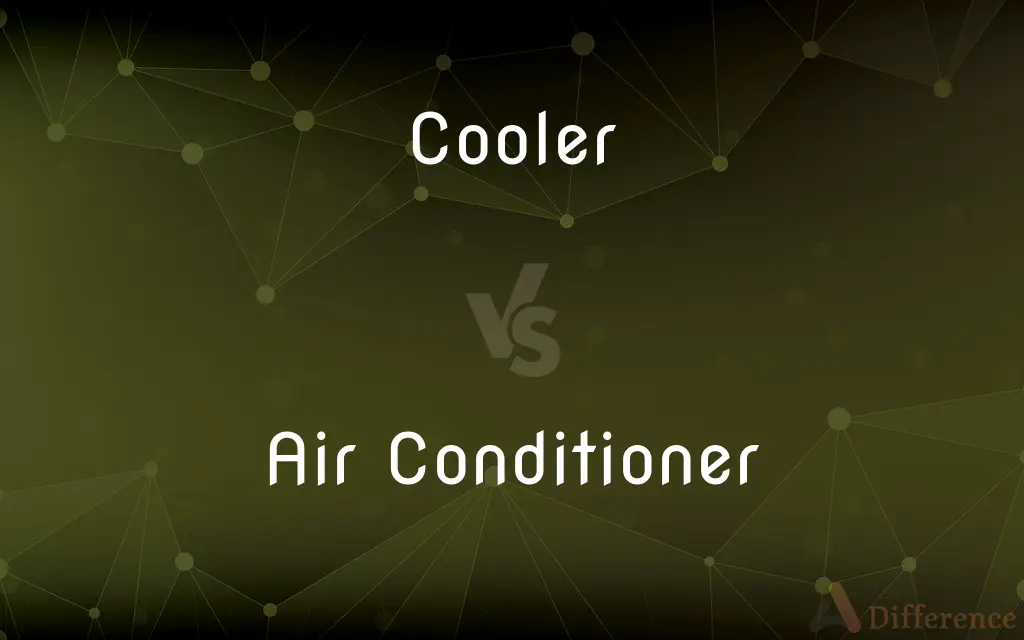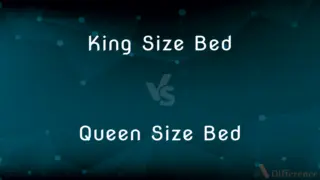Cooler vs. Air Conditioner — What's the Difference?
By Tayyaba Rehman & Fiza Rafique — Published on February 5, 2024
A cooler evaporates water to cool air, suitable for dry climates, while an air conditioner uses a refrigerant to cool and often dehumidify air, suitable for various climates.

Difference Between Cooler and Air Conditioner
Table of Contents
ADVERTISEMENT
Key Differences
A cooler, often referred to as an evaporative cooler, works by passing air over water-saturated pads, causing the water to evaporate and cool the air. An air conditioner, on the other hand, operates on a refrigeration cycle, using a chemical refrigerant to cool and dehumidify the air. Both systems aim to reduce air temperature, but their mechanisms and efficiency vary greatly.
Coolers are more energy-efficient and environmentally friendly, as they use water and simple fans, making them ideal for areas with low humidity. Air conditioners, conversely, use more energy due to their complex refrigeration process but are effective in a wide range of climates, including humid areas. Both coolers and air conditioners serve the purpose of cooling, but their suitability depends on the local climate and energy consumption preferences.
Maintenance of coolers typically involves regular cleaning and pad replacement, while air conditioners require more complex services like refrigerant refilling and filter cleaning. Coolers are generally simpler and cheaper to maintain than air conditioners. Both systems need regular maintenance for optimal performance, but the complexity and cost differ.
Coolers add moisture to the air, which can be beneficial in dry climates but problematic in already humid environments. Air conditioners, conversely, often remove moisture from the air, making them more comfortable in humid conditions. This difference in moisture output is a significant factor in choosing between a cooler and an air conditioner.
The installation of coolers is usually less complicated and less expensive than that of air conditioners. While coolers can often be portable or window-mounted, air conditioners might require more extensive installation, including ductwork for central systems. Both cooling systems offer various models to fit different needs, but the installation requirements and costs vary.
ADVERTISEMENT
Comparison Chart
Mechanism
Uses water evaporation to cool air.
Uses refrigerant for cooling and dehumidifying air.
Climate Suitability
Best for dry, low-humidity areas.
Suitable for various climates, including humid regions.
Energy Consumption
Generally more energy-efficient.
Consumes more energy due to refrigeration process.
Maintenance
Requires regular cleaning and pad replacement.
Needs more complex services like refrigerant refill and filter cleaning.
Impact on Air Quality
Adds moisture to the air.
Often removes moisture, dehumidifying the air.
Compare with Definitions
Cooler
A cooler is a device that cools air through the evaporation of water.
The cooler made the desert home much more comfortable during the hot summer.
Air Conditioner
It’s a device designed to maintain a set temperature and humidity level in a space.
We set our air conditioner to maintain a steady 72°F in our home.
Cooler
It's a simple cooling system, ideal for dry climates, using water-soaked pads.
We installed a cooler on our rooftop to beat the heat in the arid region.
Air Conditioner
An air conditioner is a system that cools and dehumidifies air using a refrigeration cycle.
The air conditioner kept the office comfortably cool throughout the sweltering summer.
Cooler
This device is an energy-efficient way to lower air temperature in suitable climates.
To save on electricity bills, we opted for a cooler instead of an air conditioner.
Air Conditioner
This system can cool, dehumidify, and even filter the air in a closed space.
The air conditioner in our apartment also filters out allergens, improving air quality.
Cooler
A cooler operates by drawing hot air through moist pads, where evaporation cools and humidifies the air.
Our cooler not only reduces the temperature but also adds needed humidity.
Air Conditioner
Air conditioners vary from portable units to large central systems, offering versatile cooling solutions.
We installed a small air conditioner in our bedroom for better sleep during hot nights.
Cooler
A device, container, or room that cools or keeps cool.
Air Conditioner
Air conditioners use a chemical refrigerant to absorb and transfer heat from the indoor air.
Our air conditioner efficiently removes the heat, making the living room much more comfortable.
Cooler
A cold drink, usually carbonated, fruit-flavored, and containing wine or other alcoholic ingredients. Also called wine cooler.
Air Conditioner
Alternative spelling of air conditioner
Cooler
(Slang) A jail.
Cooler
Anything which cools.
Cooler
An insulated bin or box used with ice or freezer packs to keep food or beverages cold while picnicking or camping.
Cooler
A device for refrigerating dead bodies in a morgue.
Cooler
A type of drink made with alcohol, especially wine, mixed with fruit juice.
They served wine coolers in the afternoon.
Cooler
Samalamig
Cooler
A prison.
Cooler
A bouncer or doorman.
Cooler
A cold deck.
Cooler
That which cools, or abates heat or excitement.
If acid things were used only as coolers, they would not be so proper in this case.
Cooler
Anything in or by which liquids or other things are cooled, as an ice chest, a vessel for ice water, etc.
Cooler
An alcoholic beverage containing liquor or wine plus a carbonated beverage, usually served with ice.
Cooler
Jail; - usually used in the form the cooler.
Cooler
An air conditioner.
Cooler
A refrigerator for cooling liquids
Cooler
An iced drink especially white wine and fruit juice
Cooler
A cell for violent prisoners
Cooler
Coolers are environmentally friendly, using water evaporation instead of refrigerants.
Our new cooler is more eco-friendly, aligning with our goal to reduce carbon footprint.
Common Curiosities
What is a cooler?
A cooler is a device that uses water evaporation to lower air temperature, ideal for dry climates.
How does an air conditioner work?
An air conditioner works by circulating a refrigerant that absorbs and expels heat, cooling and dehumidifying the air.
Are air conditioners better than coolers?
Air conditioners are more versatile and effective in various climates, but coolers are more energy-efficient in suitable environments.
Do air conditioners consume a lot of electricity?
Air conditioners typically consume more electricity than coolers due to their refrigeration process.
Can air conditioners work in any climate?
Yes, air conditioners can work in various climates, including humid and dry areas.
Does a cooler add moisture to the air?
Yes, coolers add moisture to the air, which can be beneficial in dry environments.
What is an air conditioner?
An air conditioner is a system that cools and often dehumidifies air using a refrigeration cycle.
How does a cooler work?
A cooler works by drawing hot air through water-soaked pads, where it gets cooled through evaporation.
Does an air conditioner remove humidity?
Yes, air conditioners often remove moisture from the air, helping to reduce humidity.
Are coolers energy efficient?
Yes, coolers are generally more energy-efficient compared to air conditioners.
Is a cooler suitable for humid climates?
No, coolers are not effective in humid climates as the air is already saturated with moisture.
Do coolers require a lot of maintenance?
Coolers require regular maintenance like cleaning and pad replacement, but it's usually simpler than air conditioner maintenance.
Can coolers improve air quality?
Coolers can improve air quality in dry areas by adding moisture, but they don't filter air like some air conditioners.
What maintenance does an air conditioner need?
Air conditioners need regular maintenance like filter cleaning, refrigerant refilling, and system checks.
Can I use both a cooler and an air conditioner in my home?
Yes, you can use both, depending on your needs and the local climate. Coolers for dry, hot days and air conditioners for humid, extremely hot days.
Share Your Discovery

Previous Comparison
Deskjet Printers vs. Laser Printers
Next Comparison
King Size Bed vs. Queen Size BedAuthor Spotlight
Written by
Tayyaba RehmanTayyaba Rehman is a distinguished writer, currently serving as a primary contributor to askdifference.com. As a researcher in semantics and etymology, Tayyaba's passion for the complexity of languages and their distinctions has found a perfect home on the platform. Tayyaba delves into the intricacies of language, distinguishing between commonly confused words and phrases, thereby providing clarity for readers worldwide.
Co-written by
Fiza RafiqueFiza Rafique is a skilled content writer at AskDifference.com, where she meticulously refines and enhances written pieces. Drawing from her vast editorial expertise, Fiza ensures clarity, accuracy, and precision in every article. Passionate about language, she continually seeks to elevate the quality of content for readers worldwide.
















































